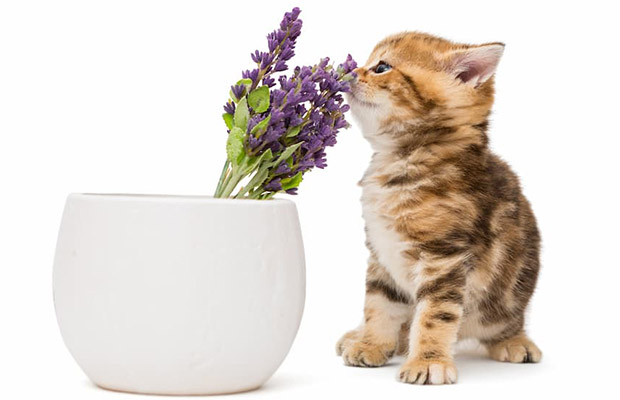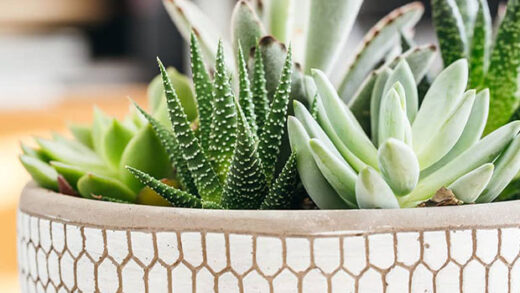Lavender has an incredibly calming scent. But is lavender safe for cats? Lavender is toxic to cats, especially when consumed. You can avoid accidentally poisoning your cat, which could be fatal, by keeping lavender plants and essential oils out of reach. We will introduce how to protect your cat when you have lavender at home.
Because of its calming, floral scent, lavender is a widely grown plant. Since it has been used in herbal remedies for thousands of years, lavender is also well known for its medicinal and therapeutic properties.
Unfortunately, the lavender plant and its essential oils are poisonous to cats and can cause serious symptoms. This article will go over the safety of lavender for cats, and what to do if your cat eats lavender, keep reading!
Table of Contents
Is Lavender Toxic to Cats?
Cats are mildly toxic to lavender, so it usually doesn’t result in death.
The toxic compounds found in the pretty purple-flowered plant are called linalool and linalyl acetate, which cats’ livers are unable to process.
Cats can develop liver damage from lavender, but only if they consume a lot of it. Cats typically only consume enough food to give them a stomach ache, but this does not mean they are safe to have around.
Despite the plant not being severely toxic, better to play it safe and keep it out of your cat’s reach.
Read More: What Do Lavender Smell Like?
How to Treat Lavender Poisoning?
Treatment for a cat with lavender poisoning entirely depends on how much the cat consumed (or absorbed) and which symptoms are manifesting. If you accidentally dropped some liquid onto her fur, give her a gentle bath in warm water with cat-friendly shampoo. Track any alterations in behavior.
Check to see if there are any diffusers running or if your cat has been exposed to lavender in any other way before calling out sneezing or wobbling. Usually, a mild irritant can be resolved by permanently separating the cat and the lavender.
It’s best to contact your veterinarian or the ASPCA’s Animal Poison Control Center right away if she licked up a sizable pool of lavender essential oil or gobbled up a bunch of lavender sprigs. Whatever you do, avoid using medication or inducing vomiting before consulting a veterinarian or a representative from a poison control center. Don’t jump to conclusions, but you might need to give your cat medication at some point to make it vomit.
Is Lavender Safe for Cats to Smell?
It’s best to keep your cat away from lavender plants and any lavender-related products, including essential oils, even though ingestion of lavender is the main cause of toxicity in cats.

The toxicity of many lavender products varies, as is only natural. If you use lavender essential oils in a diffuser, your cat should be able to spend some time in the room far from the diffuser, but that’s not always safe. Diffusers produce droplets, so a cat may unintentionally consume small amounts of lavender oil from one. Cats may also accidentally ingest lavender by rubbing up against lavender plants and grooming themselves afterwards.
It’s possible that your cat won’t approach a diffuser containing lavender oil because essential oil scents can be overpowering for them, but it’s always better to keep them safe by keeping lavender oils, plants, and other products away from them.
Also Read:
Lavender Oil Vs. Lavender Plant
Similar to the lavender plant, lavender oil is toxic to cats and is not safe for them to consume. While you might never use lavender oil to feed your cat, you might have an essential oil diffuser in your house and be concerned about its safety for your feline friend.
Is diffused lavender oil safe for cats? Diffusers have lower concentrations of lavender because the lavender oil is diluted with water. Diffusers do release a light mist into the air, but your cat can still find ways to ingest it when you’re not looking. Additionally, diffused lavender oil gets into your cat’s respiratory system. In spite of the fact that there is no known safe level of exposure to lavender oil mist, cats are extremely sensitive to odors and aerosols.
A diffuser might, at the very least, irritate your lungs and make you cough or even have trouble breathing. If your cat is hacking, think about moving the diffuser to a different room or turning it off entirely.
Cats can consume lavender oil from a diffuser by licking the misted air or when droplets fall from the diffuser’s top. Furthermore, lavender oil may get on your cat’s fur and cause toxicity when the cat grooms itself.
Read More: Can You Grow Lavender Indoors?
What Essential Oils Are Safe for My Cat?
All essential oils have the potential to have negative effects on your cat’s skin or fur, so you should only use them when prescribed by a veterinarian. Essential oils can be toxic and cause respiratory problems when inhaled or consumed. While some essential oils are thought to be safer, others are toxic to cats. To avoid any possible reactions, you should keep all essential oils away from your pet. Essential oils considered safe for cats include:
- Chamomile oil
- Jasmine oil
- Rose oil
Cats shouldn’t, of course, consume these oils. However, if you keep your cat safe by keeping them away from the diffuser while it is diffusing the essential oils, they might be safe to use in a diffuser for homes with cats. The mist has the potential to settle on nearby objects and your cat’s skin and fur, where it may cause respiratory problems or potential poisoning. Therefore, never apply essential oils directly to your cat’s skin or fur if you diffuse them.
How to Protect Your Cat?
Even though it might be tempting to diffuse some lavender to create a calming atmosphere in your home, it might not be the best option for your feline friend. Here are some ways to guard against lavender poisoning for your indoor cat.
Keep lavender out of reach of cats. Instead of lavender, grow cat-friendly plants like catnip, oat grass, and herbs like valerian, cat’s claw, and licorice root.
Lock up lavender oil and skin care products. Keep any lavender-infused bath products or oil out of reach in a locked cabinet if you use them. After using any lavender skin products, refrain from letting your pet lick diffuser sticks or your skin.
Avoid topicals containing lavender. The use of topical products containing lavender essential oils should be avoided, according to Richardson. “Avoidance of applying topical essential oils, including lavender, to your pet is the best way to avoid toxicity,” she says.
Avoid lavender essential oils or sprays. Use diffusers and sprays containing lavender only under the strictest supervision, if not never. “I would recommend complete avoidance of essential oil active diffusers or sprays,” says Richardson.
Final Words on Lavender & Cats
It might seem like a great, natural way to create a relaxing atmosphere in your home by using lavender plants, essential oils, candles, and other scented items.
Even though it’s natural, it doesn’t necessarily mean that your cat can use it. Even though the majority of feline lavender toxicity cases are mild, the risk is still not worth it. Instead, think about using other pet-safe products in your house that you don’t have to worry about your cat consuming.
There are numerous other safe houseplants for cats as well, so by purchasing only cat-friendly plants for your home, you can guarantee the health of your cat.
Read More: Smoking Lavender Pros And Cons
FAQs
Is Dried Lavender Safe for Cats?
Basically, lavender can poison your cat in any form.
Is Lavender Safe for Dogs?
Lavender is toxic to dogs, especially when consumed.
Can Lavender Kill Cats?
While a lavender plant itself isn’t toxic to your cat, formulations from the plant can be.

















